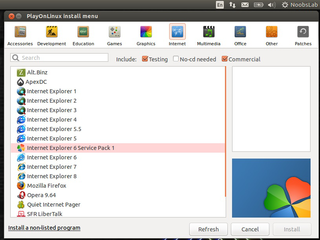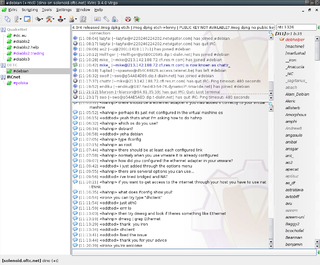The Portable Operating System Interface is a family of standards specified by the IEEE Computer Society for maintaining compatibility between operating systems. POSIX defines both the system and user-level application programming interfaces (APIs), along with command line shells and utility interfaces, for software compatibility (portability) with variants of Unix and other operating systems. POSIX is also a trademark of the IEEE. POSIX is intended to be used by both application and system developers.

Wine is a free and open-source compatibility layer to allow application software and computer games developed for Microsoft Windows to run on Unix-like operating systems. Developers can compile Windows applications against WineLib to help port them to Unix-like systems. Wine is predominantly written using black-box testing reverse-engineering, to avoid copyright issues. No code emulation or virtualization occurs. Wine is primarily developed for Linux and macOS.
CrossOver is a Microsoft Windows compatibility layer available for Linux, macOS, and ChromeOS. This compatibility layer enables many Windows-based applications to run on Linux operating systems, macOS, or ChromeOS.
In software engineering, a compatibility layer is an interface that allows binaries for a legacy or foreign system to run on a host system. This translates system calls for the foreign system into native system calls for the host system. With some libraries for the foreign system, this will often be sufficient to run foreign binaries on the host system. A hardware compatibility layer consists of tools that allow hardware emulation.

Audio Stream Input/Output (ASIO) is a computer sound card driver protocol for digital audio specified by Steinberg, providing a low-latency and high fidelity interface between a software application and a computer's sound card. Whereas Microsoft's DirectSound is commonly used as an intermediary signal path for non-professional users, ASIO allows musicians and sound engineers to access external hardware directly.

QCAD is a computer-aided design (CAD) software application for 2D design and drafting. It is available for Linux, Apple macOS, Unix and Microsoft Windows. The QCAD GUI is based on the Qt framework.
A desktop environment is a collection of software designed to give functionality and a certain look and feel to an operating system.
Binary-code compatibility is a property of a computer system, meaning that it can run the same executable code, typically machine code for a general-purpose computer central processing unit (CPU), that another computer system can run. Source-code compatibility, on the other hand, means that recompilation or interpretation is necessary before the program can be run on the compatible system.

PlayOnLinux is a graphical frontend for the Wine software compatibility layer which allows Linux users to install Windows-based video games, Microsoft Office, Microsoft Internet Explorer, as well as many other applications such as Apple iTunes and Safari.

A Unix-like operating system is one that behaves in a manner similar to a Unix system, although not necessarily conforming to or being certified to any version of the Single UNIX Specification. A Unix-like application is one that behaves like the corresponding Unix command or shell. Although there are general philosophies for Unix design, there is no technical standard defining the term, and opinions can differ about the degree to which a particular operating system or application is Unix-like.

1C Company is a Russian software developer, distributor and publisher based in Moscow. It develops, manufactures, licenses, supports and sells computer software, related services and video games.

KVIrc is a graphical IRC client for Linux, Unix, Mac OS and Windows. The name is an acronym of K Visual IRC in which the K stands for a dependency to KDE, which became optional from version 2.0.0. The software is based on the Qt framework and its code is released under a modified GNU General Public License.

The Trinity Desktop Environment (TDE) is a complete software desktop environment designed for Linux and Unix-like operating systems, intended for computer users preferring a traditional desktop model, and is free/libre software. Born as a fork of KDE 3.5 in 2010, it was originally created by Timothy Pearson, who had coordinated Kubuntu remixes featuring KDE 3.5 after Kubuntu switched to KDE Plasma 4.
Besides the Linux distributions designed for general-purpose use on desktops and servers, distributions may be specialized for different purposes including computer architecture support, embedded systems, stability, security, localization to a specific region or language, targeting of specific user groups, support for real-time applications, or commitment to a given desktop environment. Furthermore, some distributions deliberately include only free software. As of 2015, over four hundred Linux distributions are actively developed, with about a dozen distributions being most popular for general-purpose use.

Astra Linux is a Russian Linux-based computer operating system (OS) that is being widely deployed in the Russian Federation in order to replace Microsoft Windows. Initially it was created and developed to meet the needs of the Russian army, other armed forces and intelligence agencies. It provides data protection up to the level of "top secret" in Russian classified information grade by featuring mandatory access control. It has been officially certified by Russian Defense Ministry, Federal Service for Technical and Export Control and Federal Security Service.

ROSA Linux is a Linux operating system distribution, developed by the Russian company 'LLC NTC IT ROSA'. It is available in three different editions: ROSA Desktop Fresh, ROSA Enterprise Desktop, and ROSA Enterprise Linux Server, with the latter two aiming at commercial users. Its desktop computer editions come bundled with closed-source software such as Adobe Flash Player, multimedia codecs, and Steam.

Proton is a compatibility layer for Windows games to run on Linux-based operating systems. Proton is developed by Valve in cooperation with developers from CodeWeavers. It is a collection of software and libraries combined with a patched version of Wine to improve performance and compatibility with Windows games. Proton is designed for integration into the Steam client as "Steam Play". It is officially distributed through the client, although third-party forks can be manually installed.
Comparison of user features of operating systems refers to a comparison of the general user features of major operating systems in a narrative format. It does not encompass a full exhaustive comparison or description of all technical details of all operating systems. It is a comparison of basic roles and the most prominent features. It also includes the most important features of the operating system's origins, historical development, and role.











